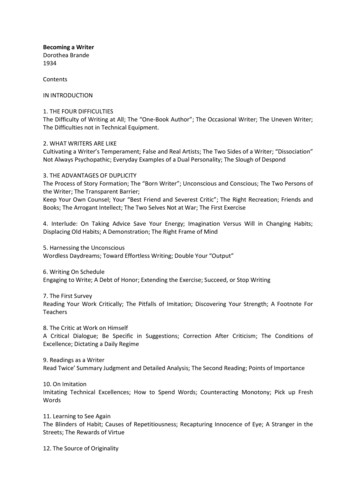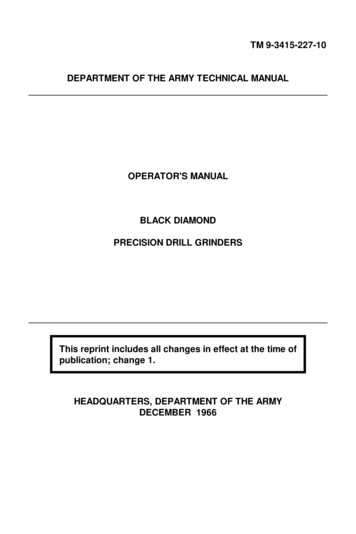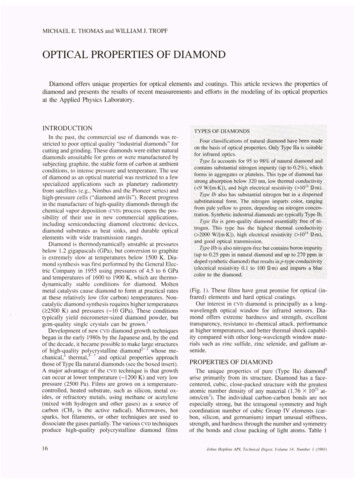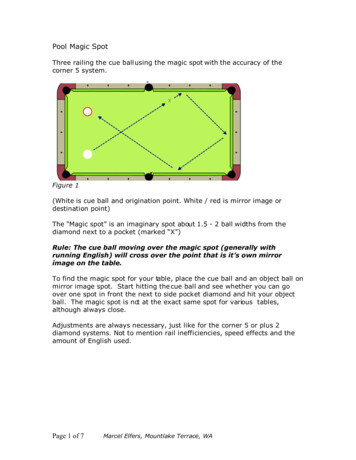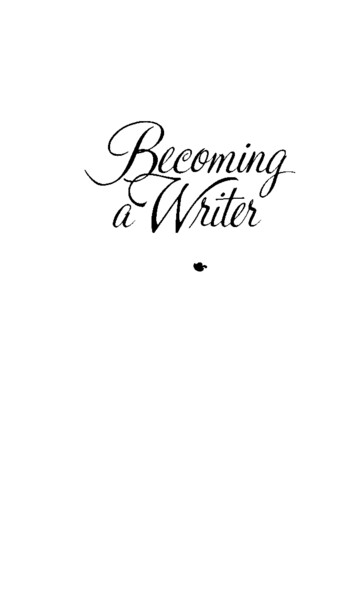
Transcription
DOROTHEA BRANDEForeword byJOHN GARDNERA Jeremy P. Tarcher/Putnam Bookpublished byG. P. PUTNAM'S SONSNew York
A Jeremy P. Tarcher/Putnam BookPublished by G P Putnam s SonsPublishers Since 1838200 Madison AvenueNew York NY 10016Library of Congress Cataloging in Publication DataBrande, Dorothea Thompson, dateBecoming a writerReprint of the 1934 ed. published by Harcourt,Brace, New YorkBibliography p. 177Includes index1 Fiction—Technique 2 Authorship I Title.PN3355B7 1981808 380-53146ISBN 0-87477-164-1Copyright 1934 byHarcourt, Brace & Company,1961 by Gilbert I. Collins and Justin Brande.Foreword 1981 by J. P. Tarcher Inc.All rights reservedLibrary of Congress Catalog Card No80- 53146Design by John BrognaMANUFACTURED IN THE UNITED STATES OF AMERICA2019181716151413
For Two Josephines
ContentsForeword by JOHN GARDNER11IN INTRODUCTION191. THE FOUR DIFFICULTIES25The Difficulty of Writing at All; The "One-BookAuthor"; The Occasional Writer; The UnevenWriter; The Difficulties Not in TechnicalEquipment.2. WHAT WRITERS ARE LIKE35Cultivating a Writer's Temperament; False andReal Artists; The Two Sides of a Writer; "Dissociation" Not Always Psychopathic; Everyday Examples of Dual Personality; The Slough of Despond.3. THE ADVANTAGES OF DUPLICITY45The Process of Story Formation; The "BornWriter"; Unconscious and Conscious; The TwoPersons of the Writer; The Transparent Barrier;Keep Your Own Counsel; Your "Best Friend and
Severest Critic"; The Right Recreation; Friendsand Books; The Arrogant Intellect; The Two SelvesNot at War; The First Exercise.4. INTERLUDE: ON TAKING ADVICE61Save Your Energy; Imagination Versus Will inChanging Habits; Displacing Old Habits; ADemonstration; The Right Frame of Mind.5. HARNESSING THE UNCONSCIOUS69Wordless Daydreams; Toward Effortless Writing;Double Your "Output."6. WRITING ON SCHEDULE75Engaging to Write; A Debt of Honor; Extending theExercise; Succeed, or Stop Writing.7. THE FIRST SURVEY81Reading Your Work Critically; The Pitfalls of Imitation; Discovering Your Strength; A Footnote forTeachers.8. THE CRITIC AT WORK ON HIMSELF89A Critical Dialogue; Be Specific in Suggestions;Correction After Criticism; The Conditions ofExcellence; Dictating a Daily Regime.9. READINGS AS A WRITER99Read Twice; Summary Judgment and DetailedAnalysis; The Second Reading; Points of Importance.
10. ON IMITATION105Imitating Technical Excellences; How to SpendWords; Counteracting Monotony; Pick Up FreshWords.11. LEARNING TO SEE AGAIN111The Blinders of Habit; Causes of Repetitiousness;Recapturing Innocence of Eye; A Stranger in theStreets; The Rewards of Virtue.12. THE SOURCE OF ORIGINALITY119The Elusive Quality; Originality Not Imitation;The "Surprise Ending"; Honesty, the Source ofOriginality ; Trust Yourself; "Your Anger and MyAnger"; One Story, Many Versions; Your Inalienable Uniqueness; A Questionnaire.13. THE WRITER'S RECREATION131Busmen's Holidays; Wordless Recreation; FindYour Own Stimulus; A Variety of Time-Fillers.14. THE PRACTICE STORY137A Recapitulation; The Contagiousness of Style;Find Your Own Style; The Story in Embryo; ThePreparatory Period; Writing Confidently; AFinished Experiment; Time for Detachment; TheCritical Reading.15. THE GREAT DISCOVERY147The Five-Finger Exercises of Writing; The Root ofGenius; Unconscious, Not Subconscious; The
Higher Imagination; Come to Terms with the Unconscious; The Artistic Coma and the Writer'sMagic.16. THE THIRD PERSON, GENIUS155The Writer Not Dual But Triple; The MysteriousFaculty; Releasing Genius; Rhythm, Monotony,Silence; A Floor to Scrub.17. THE WRITER'S MAGIC163X Is to Mind as Mind to Body; Hold Your MindStill; Practice in Control; The Story Idea as the Object; The Magic in Operation; Inducing the "Artistic Coma"; Valedictory.IN CONCLUSION: SOME PROSAIC POINTERS171Typewriting; Have Two Typewriters; Stationery;At the Typewriter: WRITE!; For Coffee Addicts;Coffee Versus Maté; Reading; Book and MagazineBuying.BIBLIOGRAPHY177INDEX181
ForewordIt's an astonishing thing that Dorothea Brande'sBecoming a Writer should ever have fallen out ofprint, and a lucky thing it is now back in the lightwhere it belongs. The root problems of the writer,whether the writer is young or old, just startingout or much published, are no different todaythan in 1934, when Becoming a Writer was firstpublished. They do not have to do with "the techniques of writing fiction" — the subject matter ofall creative writing courses — and insofar as theroot problems never get mentioned, almost allcreative writing courses are for most people mostof the time failures. The root problems of thewriter are personality problems: He or she cannotget started, or starts a story well then gets lost orloses heart, or writes very well some of the time,badly the rest of the time, or writes brilliantly but11
12Becoming a Writerafter one superb story or novel cannot writeagain, or writes brilliantly while the creativewriting course lasts but after it is over can nolonger write. The root problems, in other words,are problems of confidence, self-respect, freedom:The writer's demon is imprisoned by the variousghosts in the unconscious.Ms. Brande points out — with the delightfulwit we find everywhere in her book — that for thewriter suffering from uncertainty and self-doubt,writing teachers and books about writing, not tomention symposia of famous authors, do to theyoung (or old) struggling writer just about theworst thing they could do: "In the opening lecture, within the first few pages of his book, withina sentence or two of his authors' symposium, hewill be told rather shortly that 'genius cannot betaught'; and there goes his hope glimmering. Forwhether he knows it or not, he is in search of thevery thing that is denied him in that dismissivesentence." Ms. Brande's purpose in Becoming aWriter is to make available to the writer the verything usually denied.She is right that genius can be taught (oncethe secret emptiness of that phrase is understood)because in fact genius is as common as old shoes.Everybody has it, some more than others,perhaps; but that hardly matters, since no one
Foreword13can hope to use up more than a very small portionof his or her native gift. Every nightmare (andeven dogs have them) hints at the secret reservesof imaginative power in the human mind. Whatthe stalled or not-yet-started writer needs is somemagic for getting in touch with himself, some key.The writer needs to know what kinds of habits ofthought and action impede progress, what unnoticed forces undermine confidence, and so on.These problems are special for the writer, shepoints out. Writing teachers and how-to-writebooks are peculiarly pessimistic. "Books writtenfor painters do not imply that the chances are thatthe reader can never be anything but a conceiteddauber, nor do textbooks on engineering start outby warning the student that because he has beenable to make a grasshopper out of two rubberbands and a matchstick he is not to think he islikely ever to be an honor to his chosen profession." Ms. Brande knows and exposes the reasonsfor this mistaken pessimism in the field of writing. For one thing, most successful writers (andwriting teachers) are not conscious themselves ofhow they got past the root problems; and havinglearned by experience that they cannot helpothers past them (in fact not fully understandingthat the problems are there to get past), they givewarning in advance of their limitation, unfor-
14Becoming a Writertunately laying the blame on the student andthereby incidentally intensifying the student'sproblems.There are various other reasons for this pessimism, this widespread error, even among writing teachers, that "writing cannot be taught." Ms.Brande comments on the workaday world'sstereotypic idea about writers — how they'rechildlike, undisciplined people, possibly witches,since when writers are very good at what they dothey seem to know more than a decent personought to know. How writers, more than other artists, have no visible proof of their specialnessonce they've achieved it. Visual artists, carryingaround their leather-enclosed portfolios, andmusicians, bringing complicated and persuasivenoise out of tubing or pieces of string and wood,have cumbersome physical evidence that they arenot like other mortals. Writers only use words, aseven parrots do. The defensiveness writers feel inthe beginning and often feel even after they'veachieved success (since to write at all is to lay oneself open to attack, even scorn) can take shape, inthe older writer or writing teacher, as a kind ofarrogant exclusiveness: Though he takes yourmoney for the creative-writing course, he wouldnot have you believe you are even in potential asclever as he is. Ms. Brande says, "You are likely tohear that your desire to write is perhaps only an
Foreword15infantile exhibitionism, or to be warned that because your friends think you are a great writer (asif they ever did!) the world cannot be expected toshare that fond opinion. And so on, most tiresomely."Ms. Brande's purpose, then, is to lay the ghosts— by specific advice and exercises lead the writerinto close touch with his-her unconscious, helpthe writer to develop healthy habits (there arereasons most writers smoke too much and drinktoo much coffee, if not gin), and guide the writerto freedom from all forms of writer's block. (Herapproach, I might mention, is wonderfully forward looking: Though TM was unknown, I think,at the time she wrote, she gives ingenious andsubtle exercises in meditation, even speaks ofwhat we would call mantras.) Her whole focus,and a very valuable focus indeed, is on the writer'smind and heart. Except incidentally and in passing, she has nothing to say about writing technique. She would perhaps argue, if one could raisethe question with her, that technique lies outsidethe specific concern of this book, which is the rootproblems; but here and there she betrays a realand, based on her own experience, apparentlyjustified distrust of writing classes. At one pointshe mentions the possibility that if the studentdid not suffer the psychological ailments she isout to eradicate, he would probably not be in a
16Becoming a Writerwriting course at all. At various points she showsa touch of impatience with classes on "storyform," and she mentions that all of the creativewriting classes she herself attended were, likemost books on writing, disappointing. She speaksof the tendency of workshop writers to go afterone another's stories "tooth and fang"; and sheagain and again urges (rightly) that true originality can come only from within.It is certainly true that very few creativewriting courses get at the root problems —Ms.Brande's book makes me see that I myself havenever seen or taught one that did — but I do notshare Ms. Brande's low opinion of creativewriting classes. I do not mention this to suggestreservations about the work she does here butonly to point out that the root psychological problems are not the only problems a writer must dealwith. I cannot remember, myself, ever sufferingany form of writer's block, and I've had, I think, anumber of students who could say the same. Almost no one would argue, surely, that Cezanne'spainting students, or the piano students of Cortot,would have been better off with a smart psychiatrist, or that what the young engineer reallyneeds is a wise guru from Bombay. Though thesedays it is fashionable in some quarters to attackcreative-writing classes, it seems to me obviousthat, for the student lucky enough not to be
Foreword17plagued by psychological root problems, or forthe student who has somehow overcome thoseproblems, such classes serve an invaluable function. I can think of only a handful of well-knownAmerican writers who have not taken creativewriting courses, and usually not one course butseveral. What Ms. Brande's book suggests to me isnot that creative-writing courses do not do theirjob well, but that they do it well only for the luckyfew, turning away or turning off those whoseproblems are anterior to the matter of the course.It is easy for writing teachers to become so fixedon high standards of writing (it is his or her ownimplacable will to write well or not at all that hasmade the teacher worthy of the role), and to become so impatient with those who, presumablyfrom laziness or bad character or stupidity, do notdo their work, that teachers dismiss a majority ofthose they work with as "not really writers" ordownright nincompoops, failing to notice wherethe nincompoopery really lies. If student writersgo after one another "tooth and fang," or anywayif they try it more than once, the fault is theteacher's — he or she has failed to set the proper tone.No one can write successfully without somemeasure of technical mastery and an ability toanalyze truthfully and usefully the virtues and defects in his own work or the work of others. Those
18Becoming a Writerare the things one learns in a good creativewriting course. Ms. Brande's book brilliantly laysthe foundation for such a course. Until the rootproblems have been confronted and dealt with,the student of creative writing is the victim of anunwitting mean trick. And until the teacher hasrecognized his or her responsibility to deal withthose root human problems, as well as with thoseproblems more dear to our hearts, the teacher belongs not in the classroom but in somebody'sarmy — preferably far away. I speak of suchteachers, you will have noticed, with great scorn.One often takes that tone when one feels guilty. Imean to improve myself (pray for me), so thatwhen Ms. Brande sees me trudging towardHeaven she will not use her influence and cunningwit and have the gate locked.John GardnerSusquehanna, Pa.October 25, 1980
In IntroductionFor most of my adult life I have been engaged inthe writing, the editing, or the criticizing of fiction. I took, and I still take, the writing of fictionseriously. The importance of novels and shortstories in our society is great. Fiction supplies theonly philosophy that many readers know; it establishes their ethical, social, and material standards; it confirms them in their prejudices oropens their minds to a wider world. The influenceof any widely read book can hardly be overestimated. If it is sensational, shoddy, or vulgar ourlives are the poorer for the cheap ideals which itsets in circulation; if, as so rarely happens, it is athoroughly good book, honestly conceived andhonestly executed, we are all indebted to it. Themovies have not undermined the influence of fiction. On the contrary, they have extended its field,carrying the ideas which are already current19
20Becoming a Writeramong readers to those too young, too impatient,or too uneducated to read.So I make no apology for writing seriouslyabout the problems of fiction writers; but untiltwo years ago I should have felt apologeticabout adding another volume to the writer'sworking library. During the period of my ownapprenticeship—and, I confess, long after thatapprenticeship should have been over—I readevery book on the technique of fiction, the constructing of plots, the handling of characters,that I could lay my hands on. I sat at the feet ofteachers of various schools: I have heard the writing of fiction analyzed by a neo-Freudian; I submitted myself to an enthusiast who saw in theglandular theory of personality determination aninexhaustible mine for writers in search of characters; I underwent instruction from one whodrew diagrams and from another who startedwith a synopsis and slowly inflated it into a completed story. I have lived in a literary "colony" andtalked to practicing writers who regarded theircalling variously as a trade, a profession, and(rather sheepishly) as an art. In short, I have hadfirsthand experience with almost every current"approach" to the problems of writing, and mybookshelves overflow with the works of other instructors whom I have not seen in the flesh.But two years ago—after still more years
In Introduction21spent in reading for publishers, choosing the fiction for a magazine of national circulation, writing articles, stories, reviews and more extendedcriticism, conferring informally with editors andwith authors of all ages about their work—I began, myself, to teach a class in fiction writing.Nothing was further from my mind, on the evening of my first lecture, than adding to the topheavy literature on the subject. Although I hadbeen considerably disappointed in most of thebooks I had read and all the classes I hadattended, it was not until I joined the ranks of instructors that I realized the true basis of my discontent.That basis of discontent was that the difficulties of the average student or amateur writerbegin long before he has come to the place wherehe can benefit by technical instruction in storywriting. He himself is in no position to suspectthat truth. If he were able to discover for himselfthe reasons for his aridity the chances are that hewould never be found enrolled in any class at all.But he only vaguely knows that successful writershave overcome the difficulties which seem almostinsuperable to him; he believes that acceptedauthors have some magic, or at the very lowest,some trade secret, which, if he is alert and attentive, he may surprise. He suspects, further, thatthe teacher who offers his services knows that
22Becoming a Writermagic, and may drop a word about it which willprove an Open Sesame to him. In the hope ofhearing it, or surprising it, he will sit doggedlythrough a series of instructions in story types andplot forming and technical problems which haveno relation to his own dilemma. He will buy orborrow every book with "fiction" in the title; hewill read any symposium by authors in whichthey tell their methods of work.In almost every case he will be disappointed.In the opening lecture, within the first few pagesof his book, within a sentence or two of hisauthors' symposium, he will be told rathershortly that "genius cannot be taught"; and theregoes his hope glimmering. For whether he knowsit or not, he is in search of the very thing that isdenied him in that dismissive sentence. He maynever presume to call the obscure impulse to setdown his picture of the world in words by thename of "genius," he may never dare to brackethimself for a moment with the immortals of writing, but the disclaimer that genius cannot betaught, which most teachers and authors seem tofeel must be stated as early and as abruptly aspossible, is the death knell of his real hope. He hadlonged to hear that there was some magic aboutwriting, and to be initiated into the brotherhoodof authors.
In Introduction23This book, I believe, will be unique; for I thinkhe is right. I think there is such a magic, and thatit is teachable. This book is all about the writer'smagic.
OneThe Four DifficultiesSo, having made my apologies, and stated my belief, I am going, from now on, to address myselfsolely to those who hope to write.There is a sort of writer's magic. There is aprocedure which many an author has come uponby happy accident or has worked out for himselfwhich can, in part, be taught. To be ready to learnit you will have to go by a rather roundabout way,first considering the main difficulties which youwill meet, then embarking on simple, but stringently self-enforced, exercises to overcome thosedifficulties. Last of all you must have the faith, orthe curiosity, to take one odd piece of advicewhich will be unlike any of the exhortations that25
26Becoming a Writerhave come your way in classrooms or in textbooks.In one other way, beside the admission thatthere is an initiate's knowledge in writing, I amgoing to depart from the usual procedure of thosewho offer handbooks for young authors. Openbook after book devoted to the writer's problems:in nine cases out of ten you will find, well towardthe front of the volume, some very gloomy paragraphs warning you that you may be no writer atall, that you probably lack taste, judgment, imagination, and every trace of the special abilitiesnecessary to turn yourself from an aspirant intoan artist, or even into a passable craftsman. Youare likely to hear that your desire to write isperhaps only an infantile exhibitionism, or to bewarned that because your friends think you agreat writer (as if they ever did!) the world cannotbe expected to share that fond opinion. And so on,most tiresomely. The reasons for this pessimismabout young writers are dark to me. Books written for painters do not imply that the chances arethat the reader can never be anything but a conceited dauber, nor do textbooks on engineeringstart out by warning the student that because hehas been able to make a grasshopper out of tworubber bands and a matchstick he is not to thinkthat he is likely ever to be an honor to his chosenprofession.
The Four Difficulties27Perhaps it is true that self-delusion most oftentakes the form of a belief that one can write; as tothat I cannot say. My own experience has beenthat there is no field where one who is in earnestabout learning to do good work can make suchenormous strides in so short a time. So I am goingto write this book for those who are fully in earnest, trusting to their good sense and their intelligence to see to it that they learn the elements ofsentence and paragraph structure, that they already see that when they have chosen to writethey have assumed an obligation toward theirreader to write as well as they are able, that theywill have taken (and are still taking) every opportunity to study the masters of English prose writing, and that they have set up an exigent standardfor themselves which they work without intermission to attain.It may be that it is only my extraordinarygood fortune that I have met more writers ofwhom these things are true than deluded imbecile scribblers. But tragically enough I have met anumber of sensitive young men and women whohave very nearly been persuaded, because theyhad come up against one of the obstacles to writing which we are shortly going to consider, thatthey were unfit to write at all. Sometimes the desire to write overcame the humiliation they hadhad to undergo; but others dropped back into a
28Becoming a Writerlife with no creative outlet, unhappy, thwarted,and restless. I hope this book persuades some whoare hesitating on the verge of abandoning writingto make a different decision.In my experience four difficulties haveturned up again and again. I am consulted aboutthem far oftener than I am asked for help in storystructure or character delineation. I suspect thatevery teacher hears the same complaints, butthat, being seldom a practicing author, he tendsto dismiss them as out of his field, or to see inthem evidence that the troubled student has notthe true vocation. Yet it is the very pupils who aremost obviously gifted who suffer from these disabilities, and the more sensitively organized theyare the higher the hazard seems to them. Yourembryo journalist or hack writer seldom asks forhelp of any sort; he is off after agents and editorswhile his more serious brother-in-arms is suffering the torments of the damned because of his insufficiencies. Yet instruction in writing is oftenestaimed at the oblivious tradesman of fiction, andthe troubles of the artist are dismissed or overlooked.The Difficulty of Writing at AllFirst there is the difficulty of writing at all.The full, abundant flow that must be established
The Four Difficulties29if the writer is to be heard from simply will notbegin. The stupid conclusion that if he cannotwrite easily he has mistaken his career is sheernonsense. There are a dozen reasons for the difficulty which should be canvassed before theteacher is entitled to say that he can see no signs ofhope for this pupil.It may be that the root of the trouble is youthand humility. Sometimes it is self-consciousnessthat stems the flow. Often it is the result of misapprehensions about writing, or it arises from anembarrassment of scruples: the beginner may bewaiting for the divine fire of which he has heard toglow unmistakably, and may believe that it canonly be lighted by a fortuitous spark from above.The particular point to be noted just here is thatthis difficulty is anterior to any problems aboutstory structure or plot building, and that unlessthe writer can be helped past it there is very likelyto be no need for technical instruction at all.The "One-Book Author"Second, and far more often than the laymanwould believe, there is the writer who has had anearly success but is unable to repeat it. Here againthere is a cant explanation which is offeredwhenever this difficulty is met: this type of
30Becoming a Writerwriter, we are assured, is a "one-book author"; hehas written a fragment of autobiography, has unburdened himself of his animus against his parents and his background, and, being relieved,cannot repeat his tour de force. But obviouslyhe does not consider himself a one-book author,or we should hear nothing more from him.Moreover, all fiction is, in the sense used here,autobiographical, and yet there are fortunateauthors who go on shaping, recombining, and objectifying the items of their experience into a longseries of satisfactory books or stories. No; he isright in considering the sudden stoppage of hisgift a morbid symptom, and right, usually, inthinking it can be relieved.It is evident, if this writer had a deserved success, that he already knows something, presumably a great deal, of the technical end of his art. Histrouble is not there, and, except by happy accident, no amount of counsel and advice abouttechnique will break the deadlock. He is, in someways, more fortunate than the beginner who cannot learn to write fluently, for at least he has givenevidence of his ability to set down words in impressive order. But his first impatience at beingunable to repeat his success can pass into discouragement and go on to actual despair; and anexcellent author may be lost in consequence.
The Four Difficulties31The Occasional WriterThe third difficulty is a sort of combinationof the first two: there are writers who can, atwearisomely long intervals, write with great effectiveness. I have had a pupil whose output wasone excellent short story each year —hardlyenough to satisfy either body or spirit. The sterileperiods were torture to her; the world, till shecould write again, a desert waste. Each time shefound herself unable to work she was certain shecould never repeat her success, and, on first acquaintance, she very nearly persuaded me of it.But when the cycle was lived through from startto finish she always wrote again, and wrote well.Here again no technical instruction cantouch the difficulty. Those who suffer from thesesilences in which not one idea seems to arise, notone sentence to come irresistibly to the mind'ssurface, may write like artists and craftsmenwhen they have once broken the spell. Theteacher-consultant must form a definite idea ofthe root of the trouble and give counsel accordingly. It may be, again, that some notion of waiting for the lightning of inspiration to strike is behind the matter. Often it is the result of suchideals of perfection as can hardly bear the light ofday. Sometimes, but rarely, a kind of touchy van-
32Becoming a Writerity is at work, which will not risk any rebuff andso will not allow anything to be undertaken whichis not assured in advance of acceptance.The Uneven WriterThe fourth difficulty actually has a technicalaspect: it is the inability to carry a story, vividlybut imperfectly apprehended, to a successful conclusion. Writers who complain of this are oftenable to start a story well, but find it out of controlafter a few pages. Or they will write a good storyso drily and sparely that all its virtues are lost.Occasionally they cannot motivate their centralaction adequately, and the story carries no conviction.It is quite true that those who find themselvesin this pass can be greatly helped by learningabout structure, about the various forms whichthe story may take, of the innocuous "tricks of thetrade" which will help a story over the stile. Buteven here the real difficulty has set in long beforethe story form is in question. The author has notthe self-confidence necessary to present his ideawell, or he is too inexperienced to know how hischaracters would act in real life, or he is too shy towrite as fully and emotionally as he needs to writeif his story is to come to life. The writer who
The Four Difficulties33turns out one weak, embarrassed, or abruptly toldstory after another obviously needs somethingmore than to have his individual manuscriptscriticized for him. As soon as possible he mustlearn to trust his own feeling for the story, and torelax in the telling, until he has learned to use thesure, deft stroke of the man who is master of hismedium. So even this dilemma comes down, afterall, to being a trouble in the writer's personalityrather than a defect in his technical equipment.The Difficulties Not in TechnicalEquipmentThose are the four difficulties oftenest met atthe outset of an author's writing life. Almosteveryone who buys books on fiction writing, ortakes classes in the art of the short story, suffersfrom one or another of these troubles, and untilthey have been overcome he is able to get very little benefit from the technical training which willbe so valuable to him later. Occasionally writersare stimulated enough by the classroom atmosphere to turn out stories during the course; butthey stop writing the moment that stimulus iswithdrawn. An astonishing number who reallywant ardently to write are unable even to do assigned themes, yet they turn up hopefully —
34Becoming a Writersometimes year after year. Obviously they arelooking for help that is not being given them; andobviously they are in earnest—ready to spendwhat time, effort, and money they can to emergefrom the c
It's an astonishing thing that Dorothea Brande's Becoming a Writer should ever have fallen out of print, and a lucky thing it is now back in the light where it belongs. The root problems of the writer, whether the writer is young or old, just starting out or much published, are no different today than in 1934, when Becoming a Writer was first .


